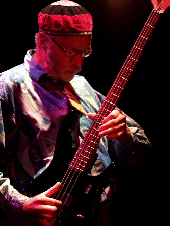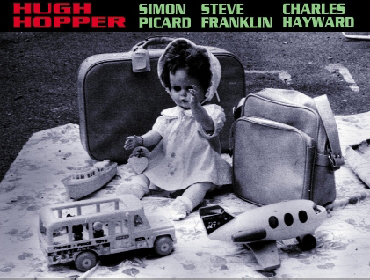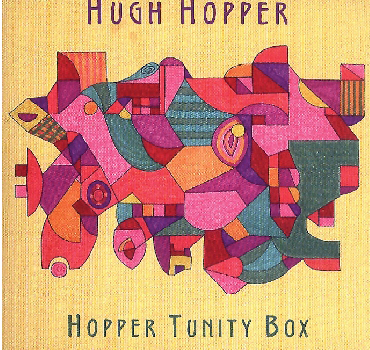|
|
| testo italiano | | |||
|
[ conversations ]
|
Hugh Hopper,
portrait of an happy man with the bass
|
|||

You’re preparing something new for 2008. May you anticipate collaborations or recordings? For example are you perhaps thinking to re-start the Hopper-Hewins duo?
Mark Hewins and I have been collaborating for many years. Sometimes we don’t play together for a year or more, but there is always a possibility of working
with him, either in duo or trio with different guests.
Is the duo your favourite formula? You have worked in many occasions with a
single partner (Hopper-Gowen, Hopper-Sinclair, Hopper-Kramer, Hopper-S
Klossner) and you will probably do the same in the future
…
I like to play in all different possible formations: solo, duo, trio or bigger
groups. Each formation has a different feeling. Bigger groups are better if I
want to compose pieces with more harmonies, but duos and trios are good if
there is a lot of improvisation. The musicians can quickly change direction and
follow another musician’s ideas.
What’s your emotive and musical approach to Soft Machine pieces? Musically speaking
you
‘re continuing to re-elaborate them inside different contexts (e.g. Delta
Saxophone Quartet or Soft Machine Legacy) but tell me something about your
feelings. Any kind of nostalgia?
Well of course the pieces are still an important part of my musical history. For many years didn’t revisit any of the Soft repertoire, wasn’t interested at all because I was doing more new pieces with different projects, but recently with more interest from public and other musicians for a retro-look at the music, I have been playing them again my pieces like Kings and Queens and Facelift and Ratledge’s Chloe and the Pirates. If they are interesting musically then it’s still a pleasure to play them. 
Translation of introduction by Antonella Capasso |
|
|
 Many people still associate you with something that happened more than thirty years ago. Does that annoy you? Is that the reason of so many Soft Machine-related projects?
It’s normal, if I went to a gig myself to see one of my own musical heroes, then I
would hope he would play an old piece or two. But Soft Machine has never been a
band that just plays its own
“standards” the way they were on record, even in the 60’s and 70’s we frequently changed the way we played the pieces and also changed the
repertoire often, so people who come to a Soft Machine Legacy gig must expect
things not to be exactly the same as on the records.
Is there still anything unreleased in the Soft Machine archive?
Only live recordings. Most of the good-quality stuff is already released.
Can you tell me how has your approach changed to samples, loops and to
technology in general from
1984 to today?
I think I still have the same feeling and approach to music, the sounds and
ambiences that I want to hear. Of course now it’s much easier and faster to produce studio music than it was in the 70’s, using computer technology.
Looking back to your career can you just name which are your best recordings or
musical experiences? And why?
Well, there are more than 100 records! I hope they all have something of value.
I still like the three tracks I played on Robert Wyatt’s Rock Bottom; my own record Hopper Tunity Box; the recent Cd Numero D’Vol (with Simon Picard, Steve Franklin and Charles Hayward). Sometimes I am happy
with a record because the finished product is what I hoped it would be when I
started. Other times, it’s because there is a lot of organic improvisation that can’t be planned but that arrived like magic, thanks to the chemistry between the
musicians. The same for live gigs.
What was it like playing recently with Robert Wyatt (Clear Frame) and Kevin Ayers (Unfairground)?
Well, Robert overdubbed his cornet playing onto the tracks we had already
recorded, so that wasn’t really playing “together”. With Kevin, he happened to be recording in the same studio when we were
recording the Soft Machine Legacy CD in 2005 and he invited me to play bass on
one track. It was fun, Kevin’s songs are very simple so it’s relaxing to play on his things. Of course, I never got paid! |
|
|
| ||||
|
For a quick overwiew on Hugh Hopper see:
www.hugh-hopper.com (official website).
http://hhopparchive.freewebspace.com Hugh Hopper Archive Pages (discography, gigs and more).
www.cloudsandclocks.net (interviews made by Beppe Colli in 2007, 2003, 1999).
http://www.unipv.it/britishrock1966-1976/testiit/hop1it.htm (Hopper on compositional techniques in Soft Machine).
…and and the interview by Alessandro Achilli and Paolo Chang on “musiche” n. 8, summer-winter 1990.
|
|
||||||
|
|
|
|
|
|
|
|
|
| [1] (2) | |||

|
 |
||